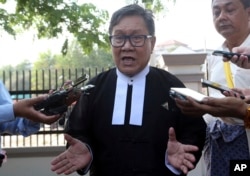When three-year-old Moe Thin Wai Zan asks why her dad has to stay at the prison in Myanmar’s main city of Yangon, her mom tells her he is working there to provide for the family.
Kyaw Soe Oo, a Reuters journalist who was arrested in late 2017 while reporting on the country’s Rohingya crisis, has been separated from his daughter for 15 months, more than a third of her young life.
During that time his only contact with her has been at court appearances, where he learned to maneuver his handcuffs to steal brief hugs with her, and in a prison visiting room.
But as she grows more aware of what is happening and questions why her father can’t come home, prison visits have become distressing.
As a result, Kyaw Soe Oo’s wife, Chit Su Win, has only brought her daughter to see him once in the past few months.
“It’s really upsetting to see her when she can’t bring him back home,” she said.
Kyaw Soe Oo and his colleague Wa Lone were sentenced to seven years in prison in September under the country’s official secrets act.
The trial was widely seen as a sham intended to punish the pair for their work uncovering a massacre of 10 Rohingya men and boys in Rakhine state - and to act as a warning to other journalists.
More than 730,000 Rohingya have fled to Bangladesh since the Myanmar military launched a crackdown in late 2017 that UN investigators said amounts to genocide.
Both the military and the government have staunchly rejected those findings, arguing the attacks were legitimate counterinsurgency operations.
The reporters’ lawyers on Tuesday began the final stages of the appeals process by presenting arguments to Myanmar’s supreme court in Naypyitaw, the capital city.
They argue that there is no evidence of a crime, and that police entrapped the pair.
Their appeal cites evidence from a police captain who testified that his superior ordered officers to “trap” Wa Lone by planting documents on him.
A decision is expected next month. If the convictions are upheld there are two more stages in the appeals process that lawyers could pursue.
Reuters’s editor-in-chief, Stephen J Adler, said in a statement that the supreme court has an opportunity to correct a “serious miscarriage of justice.”
If judges rule against them, the reporters’ last hope of being released soon is a presidential pardon.
The men did not attend Tuesday’s hearing, but their wives and daughters travelled from Yangon to be there.
It was the first time Wa Lone’s seven-month-old daughter, Thet Htar Angel, had ever flown in a plane.
Wa Lone was unable to support his wife, Pan Ei Mon, through most of the pregnancy and missed his daughter’s birth.
“Those are moments that we can’t get back,” Pan Ei Mon told VOA.
He now sees his daughter once a month, she said, and each time he finds she has grown to look more and more like her father.
“On our last visit, when it was time to leave, the baby wouldn’t let go of his hand,” she added.
Last week Kyaw Soe Oo celebrated his 29th birthday, but Chit Su Win was unable to see him as the prison was closed for a public holiday, she said.
“This is the second time I’ve had to spend my birthday in prison,” she recalls him saying on a previous visit.
“I keep telling him to keep it up, that he has his future and has his family,” she said.
When Moe Thin Wai Zan is old enough to understand, Chit Su Win looks forward to retiring the story about dad’s job at the prison and telling her daughter the truth.
“I will teach her to be proud of her father for what he has done,” she said. "He stood up for the truth, he did nothing wrong."







